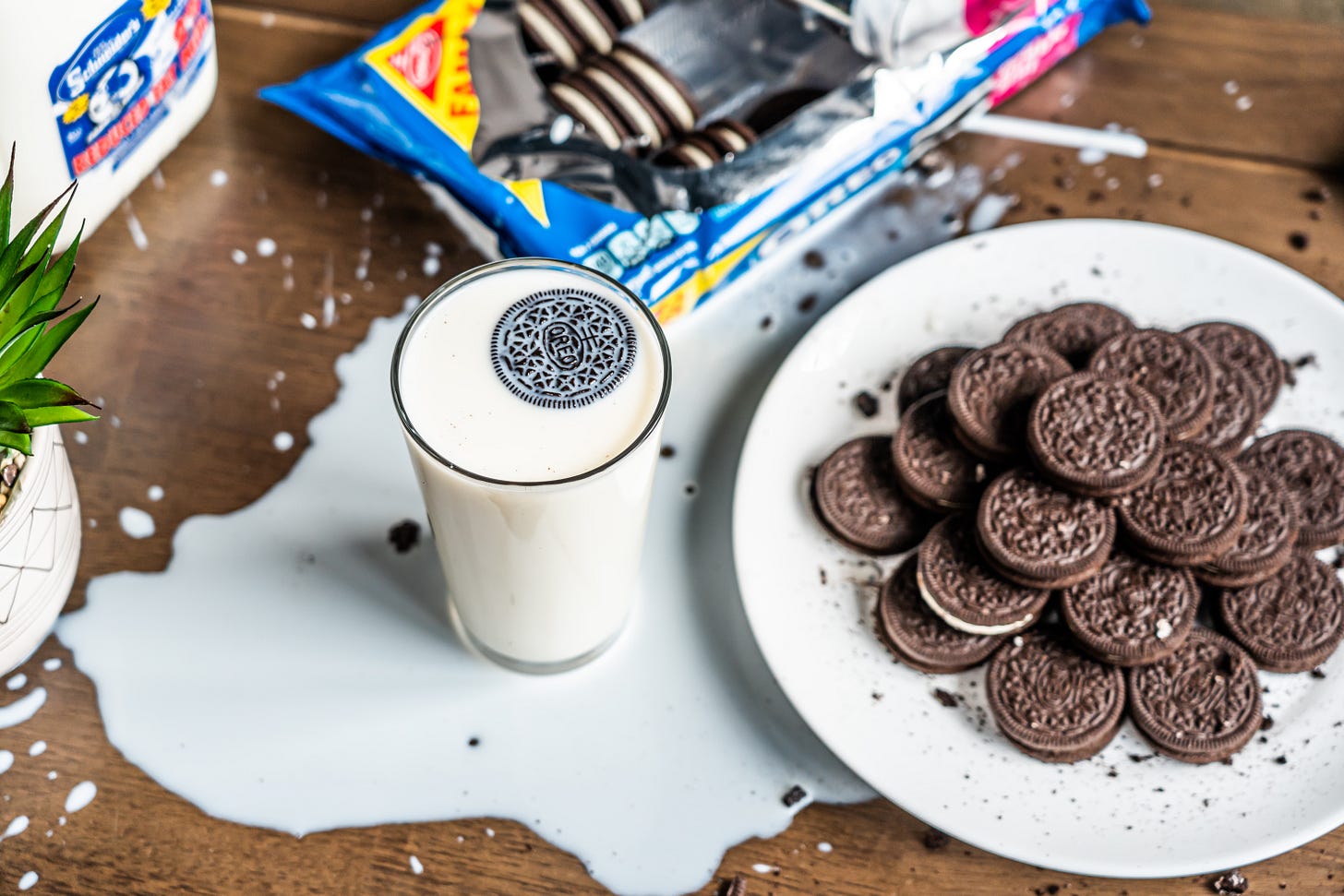
I want to share a food thought experiment with you. Literal food for thought.
But I’m not going to mention a single study because that’s boring. And as Nassim Taleb wrote in Fooled By Randomness, “logic does not require empirical verification.”
So let’s talk about Oreos.
I think everyone knows that Oreos aren’t the healthiest food. Maybe not a tiny bite, but the average American dose—like 5 to 50 in a single sitting. I have to say: they’re damn delicious.
For the sake of this thought experiment, let’s make an assumption: Oreos are not healthy for anyone in any context or dose. [1]
1) Oreos are not healthy.
One time at Costco, I saw a child-sized bag of “natural” coconut crisp cookies. Then I saw other labels on processed foods, like “keto” and “heart-healthy.” Let’s say that something similar existed—Organic Oreos.
Assuming that organic ingredients are better, does that mean Organic Oreos are healthy?
Not quite. But we can say the following:
2) Organic Oreos are better than normal Oreos.
Now meet Jake. Jake is an overweight American with some “common sense.” He knows that Oreos aren’t healthy. But then he sees something new at King Soopers: a blue box of Oreos with some shiny green stickers on it. Organic Oreos!? He chucks them in the cart. [2]
Jake probably made an automatic assumption. “Oh, these are organic, so they must be healthy for me.” Here’s why he’s wrong. It also might explain why Jake is a fat-ass:
1) Oreos are not healthy.
2) Organic Oreos are better than normal Oreos.
3) If Oreos are Organic, then Oreos are healthy.
This illogical leap is what I call the Better Equals Good Fallacy.
Better ≠ Good
In 2021, I tore my ACL and MCL playing hockey. A few weeks after surgery, my coach texted me to check in. He asked, “How’s the knee?”. I replied, “A bit better.”
But I was still a cripple! My knee was better than the day before but was still a bruised chunk of flesh.
If we assume that the nutrition facts for Organic Oreos had the exact same data, Jake is still eating Oreos, which we stated were not healthy. It’s just like the rationale behind drinking organic vodka—you’re still ingesting ethanol. [3]
Let’s recap our thought experiment:
1) Oreos are not healthy.
2) Organic Oreos are better than normal Oreos.
3) Organic Oreos are better than normal Oreos, but that doesn’t mean that they are healthy. Better ≠ good.
Better does not guarantee good. Organic is not necessarily a synonym for healthy.
Stepping outside of our food for thought, I’m not saying that organic food is bad or that you shouldn’t have a cookie. I love Oreos. The whole point is to be aware of our own biases as humans, especially that it’s in our nature to seek pleasure and avoid pain.
So be rigorous with your reasoning. Be careful with your common sense. And if you’re buying cookies, you might as well buy the cheaper ones.
Notes
[1] Here I made an a priori assumption. A priori means that something is self-evident, like a square having four sides. You don’t need data or empirical evidence to realize this.
Of course, “healthy” is an ambiguous word that is not self-evident and somewhat individualized. Is 1/1000th of an Oreo bad for you? Probably not. If you eat a fully clean diet and work out a lot, a few Oreos a week is probably harmless.
But for the love of logic, I’m making this cute absolute assumption.
As a rule of thumb for the real world, I’m generally suspicious of anyone who speaks in terms of absolutes. It really seems like a food’s “healthiness” depends on the person and their blood glucose response, genetics, and metabolism.
For example, a “low glycemic index” KIND nut bar could spike a diabetic’s blood sugar while not impacting someone who just squatted three plates.
As a general rule, I like Dr. Peter Attia’s framework of asking, could our ancestors harvest it? Natural doesn’t always mean it’s good, but we all know that we should eat fruits and vegetables.
I also like Naval Ravikant’s framework of avoiding large combos of fat and sugar because you’ll rarely find this in the wild. Think ice cream and pizza.
“Dietary fat drives satiety. Dietary sugar drives hunger. The sugar effect dominates. Control your appetite accordingly.” - Naval Ravikant
[2] Another trap I think people fall into is the “organic or nothing” mindset, where they’d rather eat an organic cookie than a non-organic carrot. For fruits and vegetables, I think organic is better than non-organic, if you can afford it.
But vitally, being organic is not necessary nor sufficient for a food to be healthy. In other words, there are healthy foods that aren’t organic and unhealthy foods that are organic.
[3] I’ve heard that the quality of ingredients can lead to less lofty blood sugar spikes and an improved gut microbiome, so I’m not discounting those here.
And on the topic of alcohol, I never realized how harmful it can be until I listened to this podcast from Dr. Huberman. I’m not saying to go into personal prohibition—just be aware of the costs.
If you read this far, you’re my type of person!
To get my writing in your inbox the second it comes out, subscribe:
Tremendous Thanks to
, , and for reading drafts of this.
